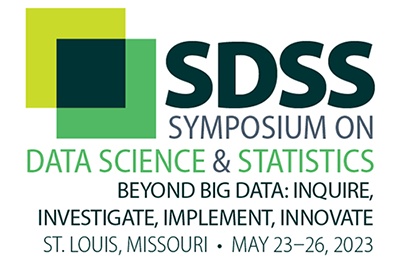Short Courses
SDSS 2023 offered half-day short courses. Short courses are ticketed events that require an additional fee.
8:30 a.m. – 5:30 p.m.
SC1 – Machine Learning Foundations: A Hands-On Introduction (All Levels)
Instructor(s): William Lamberti, University of Virginia
In this course, I will introduce the foundational approaches in machine learning. The emphasis of the course is introducing various algorithms in ML for tasks such as classification and prediction of continuous values. Learning through examples will be emphasized. Data analyzed is related—but not limited—to geography, biology, meteorology, and image analysis. Participants are highly encouraged to attend with ‘R-ready’ computers (Windows, Mac, or Linux are all acceptable.) to work on examples during the course. This course is designed for individuals who have little to no experience with ML.
Familiarity with R programming is required. However, if you are new to R and still want to attend, take the course at https://vimeo.com/ondemand/rintro or equivalent to gain the necessary skills.
8:30 a.m. – 12:30 p.m.
SC2 – Reproducible Documents, Websites, and Books with Quarto: Producing a Single Document (Beginner)
Instructor(s): Mine Çetinkaya-Rundel, Duke University
Quarto is the next generation of R Markdown for publishing dynamic and static documents with multi-lingual programming language support. With Quarto, you can create documents, books, presentations, blogs, or other online resources.
In this workshop, you will learn how to use Quarto for technical communication and computation. We’ll teach you how to get started creating and fully customizing Quarto documents (HTML, PDF, presentations) and the use of RStudio’s visual editor, which provides a user interface for editing all Pandoc markdown. We will also touch on authoring scientific manuscripts that adhere to specific journal styles.
This workshop is designed for those who have some experience with R, RStudio, and R Markdown and who want to learn Quarto. You do not need to be an advanced user of any of these; however, we will assume you have authored computational documents before. The workshop should also be accessible to those who have experience with Jupyter Notebooks.
SC3 – Effective Graphs with ggplot2 (Beginner)
Instructor(s): Joyce Robbins, Columbia University
This course is designed for complete beginners or those with some experience working with ggplot2 who want to solidify their knowledge and better understand the logic of this graphical package. We will start with the theoretical underpinnings of ggplot2 in Leland Wilkinson’s grammar of graphics framework with the goal of increasing your ability to create graphs intuitively and with a better sense of what works and what doesn’t. Next, we will cover best practices for graphing continuous data, namely histograms, boxplots, density curves, and scatterplots. We will wrap up the morning session with a discussion of data types and data transformation with tidyr.
1:30 p.m. – 5:30 p.m.
SC4 – Reproducible Documents, Websites, and Books with Quarto: Producing Websites and Books (Intermediate/Advanced)
Instructor(s): Mine Çetinkaya-Rundel, Duke University
Quarto is the next generation of R Markdown for publishing dynamic and static documents with multi-lingual programming language support. With Quarto, you can create documents, books, presentations, blogs, or other online resources.
In this workshop, you will learn how to use Quarto for technical communication and computation. We’ll teach you how to create Quarto projects with multiple documents and organize them as websites (including blogs) and books.
This workshop is designed for those who have some experience with R, RStudio, and Quarto and want to learn how to take their skills further to create Quarto websites and books. You do not need to be an advanced user of any of these; however, the workshop will assume you have authored computational documents before.
If you do not have prior experience with authoring Quarto documents in RStudio, we recommend taking the morning workshop on creating single documents with Quarto first.
SC5 – Effective Graphs with ggplot2 (Intermediate/Advanced)
Instructor(s): Joyce Robbins, Columbia University
This course is designed for those with some experience with ggplot2—the morning session is sufficient—who wish to expand their graphing repertoire and skill set. First, we will discuss best practices for categorical data, namely bar charts and Cleveland dot plots. Since knowing how to reorder factor levels is essential for creating effective graphs with categorical data, we will introduce a number of helpful functions from the forcats package. The second topic of the afternoon will be faceting, a powerful and underused tool for creating multiple panels that differ only by factor level. We will end the day with tips and tricks to make your graphs audience-ready, including the intentional use of color and theme elements.

